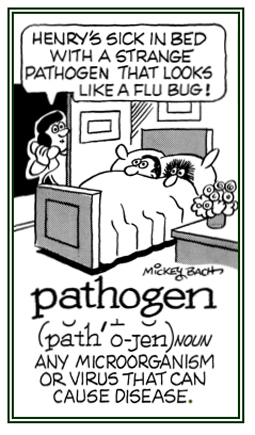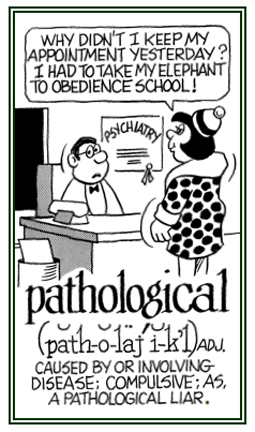path-, patho-, -path-, -pathia, -pathic, -pathology, -pathetic, -pathize, -pathy
(Greek: feeling, sensation, perception; suffering, disease, or disorder; a system of treating diseases)
In medicine, some of these elements usually mean "someone who suffers from a disease of, or one who treats a disease"; so, they should not be confused with the words that mean "feeling" which are also shown on these pages even though both meanings come from the same Greek element.
Pathogens proceed to establish themselves, multiply, and produce various symptoms in their hosts.

Go to this Word A Day Revisited Index
so you can see more of Mickey Bach's cartoons.
2. Relating to the science of the signs and symptoms of diseases: When the doctor examined Judy, he noticed the typical pathognomic indications that pointed to a particular disease that was circulating among children in the area.
Such distinctive visual and pathognomonic clues can indicate a certain illness on which a diagnosis can be made.
2. The science of the signs by which human passions are indicated: Pathognomy includes the outward expression of a person's feelings.
Pathognomy is the study of passions and emotions. It refers to the expression of emotions that are indicated in the voice, gestures, and by features.
While physiognomy is used to predict the overall character of an individual, pathognomy is used to gain clues about the current character.
Physiognomy is based on shapes of the features, and pathognomy on the motions of the features.
A pathography can also be an individual's sensational biography or one containing the morbid ailments.
Mark's little boy had developed the tendency to be a pathological liar who could not be trusted to tell the truth about anything.
2. Relating to a disease: Sue has a pathologic condition that requires medical attention.3. A reference to the study of diseases: Dr. Smith was involved in the diagnosis of the pathological epidemic that had spread in so many African countries.



